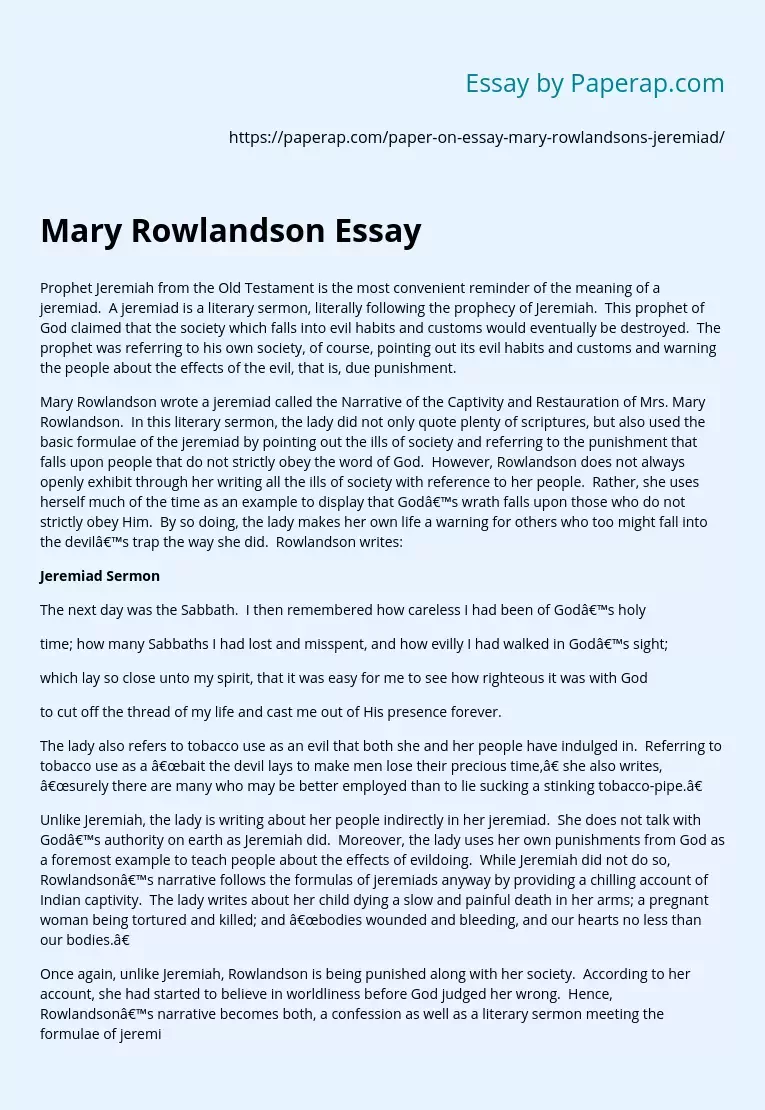Mary Rowlandson Essay
Prophet Jeremiah from the Old Testament is the most convenient reminder of the meaning of a jeremiad. A jeremiad is a literary sermon, literally following the prophecy of Jeremiah. This prophet of God claimed that the society which falls into evil habits and customs would eventually be destroyed. The prophet was referring to his own society, of course, pointing out its evil habits and customs and warning the people about the effects of the evil, that is, due punishment.
Mary Rowlandson wrote a jeremiad called the Narrative of the Captivity and Restauration of Mrs. Mary Rowlandson. In this literary sermon, the lady did not only quote plenty of scriptures, but also used the basic formulae of the jeremiad by pointing out the ills of society and referring to the punishment that falls upon people that do not strictly obey the word of God. However, Rowlandson does not always openly exhibit through her writing all the ills of society with reference to her people.
Rather, she uses herself much of the time as an example to display that God’s wrath falls upon those who do not strictly obey Him. By so doing, the lady makes her own life a warning for others who too might fall into the devil’s trap the way she did. Rowlandson writes:
Jeremiad Sermon
The next day was the Sabbath. I then remembered how careless I had been of God’s holy
time; how many Sabbaths I had lost and misspent, and how evilly I had walked in God’s sight;
which lay so close unto my spirit, that it was easy for me to see how righteous it was with God
to cut off the thread of my life and cast me out of His presence forever.
The lady also refers to tobacco use as an evil that both she and her people have indulged in. Referring to tobacco use as a “bait the devil lays to make men lose their precious time,” she also writes, “surely there are many who may be better employed than to lie sucking a stinking tobacco-pipe.”
Unlike Jeremiah, the lady is writing about her people indirectly in her jeremiad. She does not talk with God’s authority on earth as Jeremiah did. Moreover, the lady uses her own punishments from God as a foremost example to teach people about the effects of evildoing. While Jeremiah did not do so, Rowlandson’s narrative follows the formulas of jeremiads anyway by providing a chilling account of Indian captivity. The lady writes about her child dying a slow and painful death in her arms; a pregnant woman being tortured and killed; and “bodies wounded and bleeding, and our hearts no less than our bodies.”
Once again, unlike Jeremiah, Rowlandson is being punished along with her society. According to her account, she had started to believe in worldliness before God judged her wrong. Hence, Rowlandson’s narrative becomes both, a confession as well as a literary sermon meeting the formulae of jeremiads. Still, the lady expresses the fact that even the favorite people of God are chastened by Him. She refers to David in her account: “They told me I lied, and taking up a hatchet, they came to me, and said they would knock me down if I stirred out again, and so confined me to the wigwam. Now may I say with David, ‘I am in a great strait’ (2 Samuel 24.14).”
Following this confession/jeremiad, Mrs. Mary Rowlandson’s becomes innocent again in the eyes of the Lord.
Mary Rowlandson Essay. (2019, Dec 05). Retrieved from https://paperap.com/paper-on-essay-mary-rowlandsons-jeremiad/

